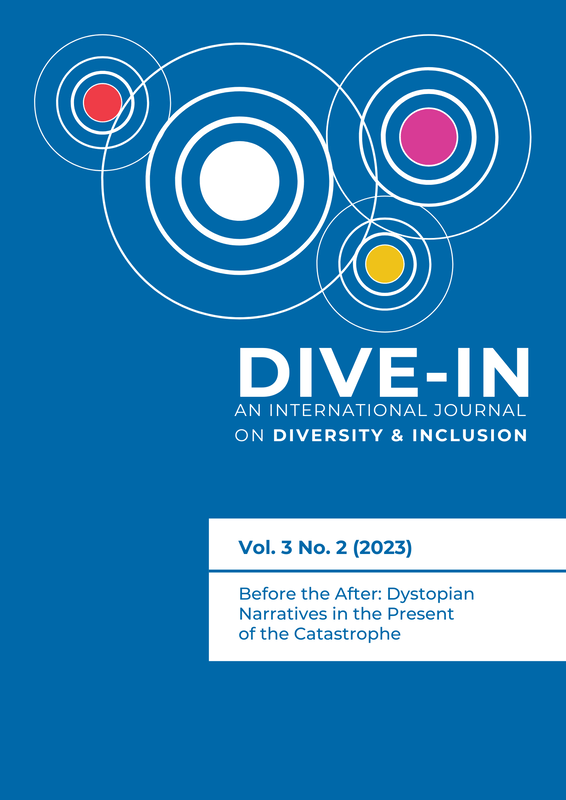Il viaggio di Clitennestra attraverso i secoli: da Micene a Metropolis
DOI:
https://doi.org/10.6092/issn.2785-3233/19146Keywords:
myth, dystopia, Clytemnestra, theatre, post-apocalypticAbstract
In 2015, the Sicilian director Vincenzo Pirrotta re-elaborated the myth of Clytemnestra in his drama Clitennestra Millennium. La caduta degli dèi. Tragedia post – moderna in tre mondi, in which Clytemnestra returns to Mycenae, in a post-apocalyptic scenario, where all traces of ancient beauty were destroyed after a terrible plague that hit the city and which led to the dictatorship of the Elektra and Oreste. The work is full of literary and cinematographic references, such as La caduta degli dèi by Luchino Visconti and Metropolis by Fritz Lang. In particular, Johann Fredersen’s journey towards a dehumanized environment is comparable to the journey that Clytemnestra embarks on to reach his own children towards the brighter world, behind whose light, however, the crisis of values that characterizes society is hidden, due to which it is difficult to speak of humanity, but where there is only place for ashes and ruins.
References
“tragedy” n.d. In Cambridge Dictionary, Cambridge University Press, https://dictionary.cambridge.org/dictionary/english/tragedy [ultimo accesso 31/12/2023].
Allegri, Luigi. 2018. “C’era una volta Pirandello…Il dialetto come lingua dell’innovazione nella nuova drammaturgia siciliana.” In Dominique Budor & Maria-Pia De Paulis-Dalembert (eds.), Sicile(s) d’aujourd’hui, 175-177. Paris: Presses Sorbonne Nouvelle.
Aristotele. 1998 (334-330 a.C.). Poetica, trad. it. Guido Paduano. Bari: Laterza.
Barone, Caterina. 2014. Ifigenia. Variazioni sul mito. Venezia: Marsilio.
Barton, Riven. 2016. “Dystopia and the Promethean Nightmare.” In Louisa MacKay Demerjian (ed.), The Age of Dystopia: One Genre, Our Fears and Our Future, 7–13. Newcastle upon Tyne UK: Cambridge Scholars Publishing.
Brecht, Bertolt. 2017 (1946). L’opera da tre soldi. Trad. E. Castellani. Torino: Einaudi.
Claeys, Gregory. 2013. “Three variants on the concept of dystopia.” In Fátima Vieira (ed.)., Dystopia(n) Matters: On the Page on Screen on Stage, 14–18. Newcastle upon Tyne: Cambridge Scholars Publishing.
Claeys, Gregory. 2017. Dystopia: A Natural History. A Study of Modern Despotism, its Antecedents, and its Literary Diffractions. Oxford: Oxford University Press.
Conti, Valentina. 2020. “Il contagio distopico.” Comparatismi 5, 163–172.
Conversi W., Leonard & Richard B. Swall. n.d. “Arts & Culture. Tragedy. Literature.” Encyclopaedia Britannica, https://www.britannica.com/art/tragedy-literature [ultimo accesso 17/08/2023].
Eschilo. 1995. Orestea: Agamennone, Coefore, Eumenidi. Introduzione V. Di Benedetto; traduzioni e note E. Medda, L. Battezzato, M.P. Pattoni. Milano: BUR Rizzoli.
Godono, Elvira. 2001. La città nella letteratura postmoderna. Napoli: Liguori.
Hall, Edith. 2004. “Introduction.” In Edith Hall, Fiona Macintosh, & Amanda Wrigley (eds.), Dionysus Since 69: Greek Tragedy at the Dawn of the Third Millennium, 1–46. Oxford: Oxford University Press.
Komar L., Kathleen. 2003. Reclaiming Klytemnestra: Revenge or Reconciliation. Urbana (IL): University of Illinois Press.
Kumar, Krishan. 1987. Utopia and anti-Utopia in Modern Times. Oxford: Blackwell.
Lehmann, Hans-Thies. 2006. Postdramatic Theatre. Oxon: Routledge.
Longhi, Claudio. 2001. Tra moderno e postmoderno. La drammaturgia del Novecento. Pisa: Pacini Editore.
Losada Goya, José Manuel. 2021. “Introducción”. In José Manuel Losada Goya & Antonella Lipscomb (eds.), Mito Y Ciencia Ficción, 9–13. Madrid: Sial.
Losada Goya, José Manuel. 2022. Mitocritica culturale. Un definición del mito. Madrid: ediciones Akal.
Montanari, Franco. 2008. “Mito e poesia: la figura di Clitennestra dall’Odissea a Eschilo”, In Συναγωνίζεσθαι. Studies in Honour of Guido Avezzù, 1(1), 150-154.
Pirrotta, Vincenzo. 2015. Clitennestra Millennium, La caduta degli dèi. Tragedia post-moderna in tre mondi. Palermo. Glifo Edizioni.
Revermann, Martin. 2008. “The Appeal of Dystopia: Latching onto Greek Drama in the Twentieth Century.” Arion: A Journal of Humanities and the Classics 16(1), 97–118.
Secci, Lia (a cura di). 2008. Il mito di Ifigenia. Da Euripide al Novecento. Roma: Artemide.
Segal, Charles. 1992. “Tragic beginnings: narration, voice, and authority in the prologues of Greek drama.” In Francis Dunn & Thomas Cole (eds.), Beginnings in Classical Literature, 85–112. Cambridge: Cambridge University Press.
Zeitlin, Froma I. 1990. “Thebes: Theater of Self and Society in Athenian Drama.” In John J. Winkler & Froma I. Zeitlin (eds.), Nothing to Do with Dionysos? Athenian Drama in Its Social Context, 130–167. Princeton: Princeton University Press.
La caduta degli dèi. Dir. Luchino Visconti, Italia/Germania Ovest, 1969.
Metropolis. Dir. Fritz Lang, Germania, 1927.
Millennium. Dir. Michael Anderson, USA, 1989.
Downloads
Published
How to Cite
Issue
Section
License
Copyright (c) 2023 Cristiana Desiderio

This work is licensed under a Creative Commons Attribution 4.0 International License.





